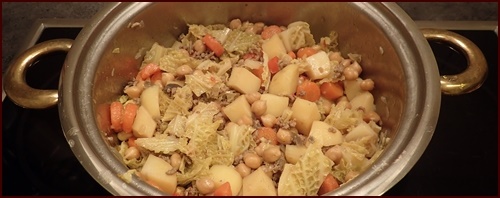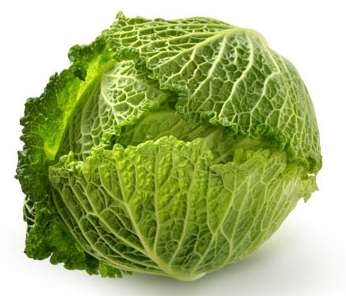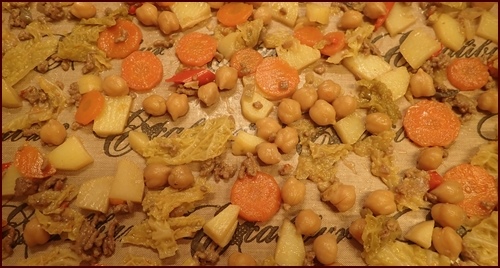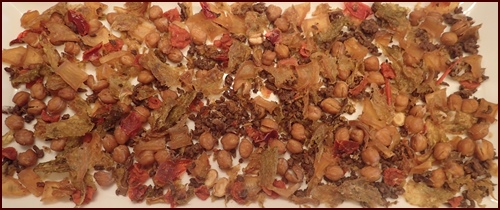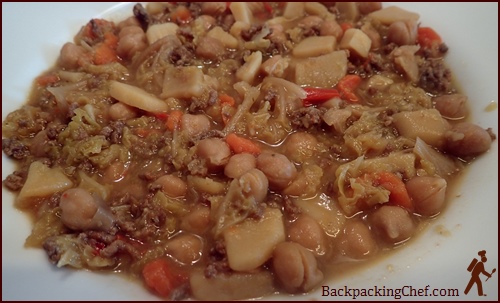| Back to Back Issues Page |
 |
|
December 2015 Trail Bytes: How to Make & Dehydrate Stew December 23, 2015 |
| Hello, In Switzerland, the word for stew is “Eintopf.” If you break the word into its two German parts, “ein” means “one,” and “topf” means “pot.” For this issue of Trail Bytes, Dominique shared her recipe for a winter Eintopf and I dehydrated a portion of the leftovers for a backpacking style meal. Enjoy!
Winter EintopfServings: 6Ingredients: 1 Red Onion, diced 2 cloves Garlic, minced 1 Red Bell Pepper, diced 2 cups Chickpeas, uncooked 4 – 5 medium Carrots, chunked ½ head of Savoy Cabbage, cut 5 – 6 medium Potatoes, chunked 1 pound Ground Beef 1 Tbsp. Sunflower Oil 2½ Vegetable Bouillon Cubes
Step One: Soak chickpeas, also called garbanzo beans, in water six hours or overnight and drain. If you don’t have time for soaking, use two cans of chickpeas, drained. Step Two: Fry onion, bell pepper, and garlic for two minutes in one tablespoon or less of oil. Add ground beef and one bouillon cube. Cook until done. Dominique cooked the meat in a separate frying pan and set it aside. If planning to dehydrate the meal, blot off any grease with a paper towel after the meat is cooked. Step Three: In a stock pot, add carrots, chickpeas, and 1½ bouillon cubes to two cups water. Bring to a boil, then reduce heat to low and simmer for 30 minutes. If using canned chickpeas, use less water add them and the carrots plus bouillon at the same time as the potatoes and cabbage. Add potatoes and savoy cabbage to pot and cook another 20 – 30 minutes on low heat until tender. Add a little more water if needed. Once chickpeas and vegetables are tender, add meat to pot and cook for ten minutes.
Dehydrating Stew To ensure even drying so that no moisture remains in thicker pieces of food, cut potatoes and carrots into smaller pieces. You can also make this recipe with stew meat. If so, cut cooked meat into smaller pieces. If you use homemade chickpeas and they are still very firm, cut a little slice into each one so that they rehydrate better in a meal. If you used canned chickpeas there is no need to cut them.
I dehydrated two cups of stew on one Excalibur Dehydrator tray covered with a non-stick sheet.
Dehydrated at 135° F for ten hours. The yield was one cup dry.
I rehydrated the dried stew in a Thermos Food Jar (shown rehydrated above) to simulate taking it to enjoy as a hot lunch on a winter hike. In the morning I added one cup of dried stew to the Thermos Food Jar with one and a half cups of boiled water. It was hot and delicious for lunch. To prepare the stew in a pot to eat right away, use a quarter cup less water. Normandy Trip Follow-upIn the September newsletter, I included a picture of the marble cross marking the grave of Cpl. Donald E. McAllister at the Normandy-American Cemetery. I share the same last name as Cpl. Donald E. McAllister, but I am not a direct relative of his. After the newsletter went out, I heard from one of our subscribers, P. McAllister, who turned out to be the great nephew of Cpl. Donald E. McAllister. He passed the newsletter along to his father, Donald McAllister, who was named after his uncle. They were happy to see the photo and I was very happy to hear from them and learn more about this brave man who died parachuting into Normandy on D-Day.New Recipes SharedHomemade Instant Black Bean Soup shared by Skip Jackson.Rice & Sausage Dinner shared by GreyWolf. Thanks for sharing! View the recipes here. Seasons GreetingsI hope you get out for plenty of hikes this winter (or summer for our friends in Australia) and that you try some of the hot lunch ideas I’ve been writing about in the newsletters. It’s been a mild winter so far in Switzerland. We’re still waiting for snow. Dominique and I wish you a Merry Christmas and a Happy New Year.Warmest regards, Chef Glenn & Dominique P.S. If you have any questions or comments about this issue of Trail Bytes, please reply to this email or use the contact form at BackpackingChef.com. Click to purchase my backpacking cookbook, Recipes for Adventure. Thank you! If you received this newsletter from a friend and would like to subscribe (it's free), subscribe here. Visit my BackpackingChef Facebook page for the lastest posts. |
| Back to Back Issues Page |
